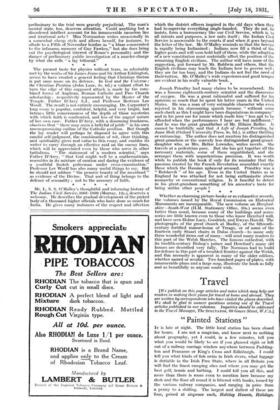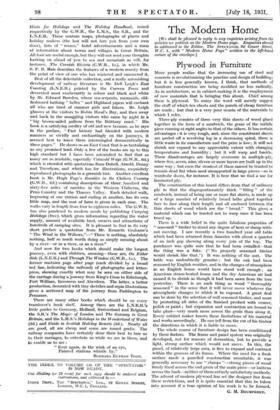Travel
[We publish on this page articles and notes which may help our readers in making their plans for travel at home and abroad. They are written by correspondents who have visited the places described. We shall be glad to answer questions arising out of the Travel articles published in our columns. Inquiries should be addressed to the Travel Manager, The SPECTATOR, 99 Gower Street, W.C.1.1
" Painted Stations "
IT is late at night. The little local station has been closed for hours. I am not a magician, and know next to nothing about geography, yet I could, in a few minutes, tell you what you would be likely to see if you glanced right or left out of a railway carriage window anywhere between Padding- ton and Penzance or King's Cross and Edinburgh. I could tell you what kinds of fish swim in Irish rivers, what luggage is dutiable in the Irish Free State, where in all Britain you will find the finest camping sites and where you may get the best golf, tennis and bathing. I could tell you all this, and more than there is room even to mention here because my desk and the floor all round it is littered with books, issued by the various railway companies, and ranging in price from a penny to a shilling. The largest and dullest of these are "four, priced at sixpence each, Holiday Haunts, Holidays,
Hints for Holidays and The Holiday Handbook, issued respectively by the G.W.R., the L.M.S., the S.R., and the L.N.E.R. These contain maps, photographs of places and holiday makers (the last will not lure you from your own door), lists of " rooms," hotel advertisements and a mass of information about towns and villages in Great Britain. All four are useful enough, but they will not send your thoughts barking on ahead of you to sea and mountain as will, for instance, The Cornish Riviera is.), in which Mr. S. P. B. Mais describes the features of a western county from the point of view of one who has wintered and summered it.
Best of all the delectable collection, and a really astonishing development of railway literature is Mr. Dell Leigh's East Coasting (L.N.E.R.) printed by the Curwen Press and decorated most exuberantly in colour and black and white by Mr. Edward Bawden, whose sea-serpents, mermaids, old- fashioned bathing " belles " and Highland pipers will enchant all who are tired of summer girls and hikers. Mr. Leigh glances at the visitors to Robin Hood's Bay, and then away and back to the smuggling visitors who came by night in a " big brown-sailed galleon from the Brittany coast." His book is a satisfying medley of old and new because, as he says in the preface, " Past history had blended with modern manners so vividly and enchantingly on the journeys, it seemed best to leave them intermingled democratically in these pages." He shows us an East Coast that is as tantalizing as any promised land. Only a few of the books are up to this high standard but I have been astonished to find that so many are so readable, especially Cotswold Ways (G.W.R., 6d.) which is crowded with quotations from Dobell, Arnold, Denny and Trevelyan, and which has for illustrations, exquisitely reproduced photographs in a greenish tint. Another excellent book is Mr. Hugh Page's Rambles in the Chiltern Country (G.W.R., 6d.) containing descriptions of three hundred and sixty-five miles of rambles in the Western Chilterns, the Penn Country and the Thames Valley. Each detailed walk, beginning at one station and ending at another, has its own little map, and the cost of fares is given in each case. The walks vary in length from four to eighteen miles. The G.W.R. has also pandered to modem needs by publishing Camping Holidays (free), which gives information regarding the water supply, amount of available land, owners and attractions of hundreds of camping sites. It is pleasant to find in its very short preface a quotation from Mr. Kenneth Grahame's " The Wind in the Willows,"—" There is nothing, absolutely nothing, half so much worth doing as simply messing about by a river—or in a river, or on a river."
And now for two books which should make the longest journey, even with children, amusing—these are, On Either Side (L.N.E.R.) and Through The Window (G.W.R., is.). The former contains page after page (each divided by a broad red line, indicating the railroad) of photographs and letter- press, showing exactly what may be seen on either side of the carriage during a journey from King's Cross to Edinburgh, Fort William, Inverness and Aberdeen. The latter, a better production, decorated with tiny sketches and sepia illustrations gives a sectioned map of the journey from Paddington to Penzance.
There are many other books which should be on every trainlover's book shelf. Among them are the L.N.E.R.'s little guides to Germany, Holland, Switzerland and Belgium, the S.R.'s The Magic of London and The Gateway to Great Britain, and the L.M.S.'s Holidays in the Wonderland of Wales (3d.) and Guide to Scottish Holiday Resorts (3d.). Nearly all are good, all are cheap and some are issued gratis. The railway companies have certainly done their best to lure us to their carriages, to entertain us while we are in them, and to enable us to see :
" Ever again, in the wink of an eye, Painted stations whistle by."
BARBARA EUPHAN TODD.



































 Previous page
Previous page